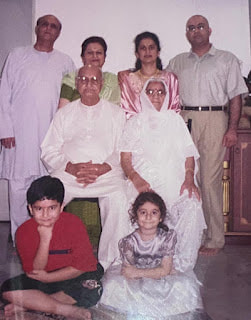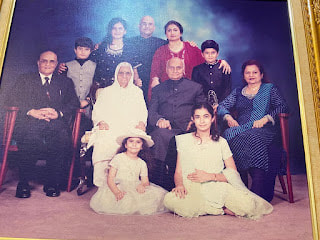From Karachi to Malaysia Four generations of Shankar's family in Malaysia (Shankar: Standing - left) Four generations of Shankar's family in Malaysia (Shankar: Standing - left) Born in 1938 in Karachi, Sindh, British India, Shankar Sukhani was a mere nine years old when his family left their hometown for Jaipur, following the 1947 partition. If there’s one word that sums up Shankar’s memories, it’s the word “green”. Green for the pastures and land that he fondly associates with Karachi. Green for the wealth of the community in Karachi. And green for how the Sindhis who left their hometown prospered in countries far and wide. Shankar currently resides in Kuala Lumpur, Malaysia, and this is his story. Shankar’s father was in the tailoring business – he had his own shop. “He was really good in this business,” Shankar recalls. “He was even the Vice President of the Cloth Association.” In fact, it was his father’s trade, and connections that he had made through his trade, that enabled the family to move to Jaipur. “The dhobi who worked with us for many, many years in Karachi mentioned to my father of a space he knew in Jaipur, which might be good for a shop”. So, in 1942, Shankar’s father and uncle went to Jaipur to see the space. They thought it was quite a reasonable place to be in, which is why when partition took place in 1947, Jaipur was the place that came to Shankar’s father’s mind to relocate the family. Shankar’s family made the decision to leave Karachi when riots and general unrest started happening following partition. It was no longer safe for them to be in their home. The last day before leaving Karachi was a “horror”, Shankar says – he remembers needing to go to his father’s shop to get something. Along the way, riots were happening and while escaping the mess, Shankar lost his slippers and had to run barefoot to reach home safely. To leave Karachi, the family took a ship to Gujarat, then onward to Jaipur to reach the refugee camps that the Indian government had set up. At these camps, although the Indian government had provided free food, Shankar recalls that an informal economy sprouted up within these camps - small shops set up by enterprising people. Once they left the camp, Shankar’s family of four siblings and his parents (Shankar has seven siblings in total, but three were born post-partition in India) stayed in a rented house where there were 25 people sharing four rooms and one washroom. Later, they were able to purchase land at a cheap rate from the government. Although they were able to obtain land, there were still other financial matters to think about – it wasn’t easy, as the family had to leave everything behind when they came to Jaipur. Shankar left Karachi when he was in the third standard. So, when he arrived in Jaipur, he recommenced his schooling from the fourth to the seventh grade, where a Sindhi school had opened. In this school, he also studied Hindi and English. When he was in the eight grade, Shankar moved to a Scottish missionary school. He still remembers the name of the school’s head – “The school was run by a man named Mr Biaspal.” Following the eight grade, Shankar then went on to do his matriculation, followed by college, and then out into the working world. During his matriculation, Shankar passed his Hindi and English with first class honours. For the students who were top scorers, the Indian government provided financial stipends for engineering courses – Shankar was one of them, and he went on to receive an admission for a four-year civil engineering course. In 1995, Shankar’s family left India for good and moved to Kuala Lumpur, Malaysia. When looking back on life in Karachi, Shankar says it was "beautiful". He say, "It was a good life. Cycling was a huge thing instead of cars, and we lived comfortably." What about life in post-partition India? “It was difficult,” Shankar says candidly. “When we arrived in Gujarat, I remember being struck by how different things were,” he says. “Although coming from the same ‘country’, the language, clothes and culture were totally different.” Shankar also explained that Sindhis were being called ‘refugees’, a term he felt others had attached a very negative connotation to. “We wanted to show everyone that we are hard workers, that we will put in our own effort. We studied hard, built our business from the ground up and made our money back again. Today, Sindhis all over the world have proved our resilience time and again,” Shankar says proudly.
0 Comments
Your comment will be posted after it is approved.
Leave a Reply. |
AuthorKeen interest in Partition stories originating from the Province of Sindh. Archives
January 2022
Categories |

 RSS Feed
RSS Feed
